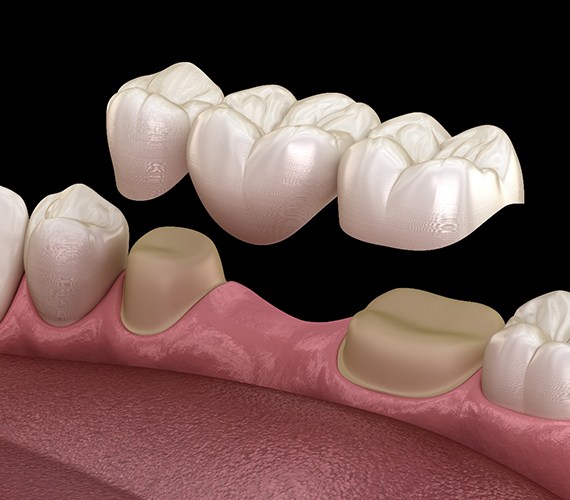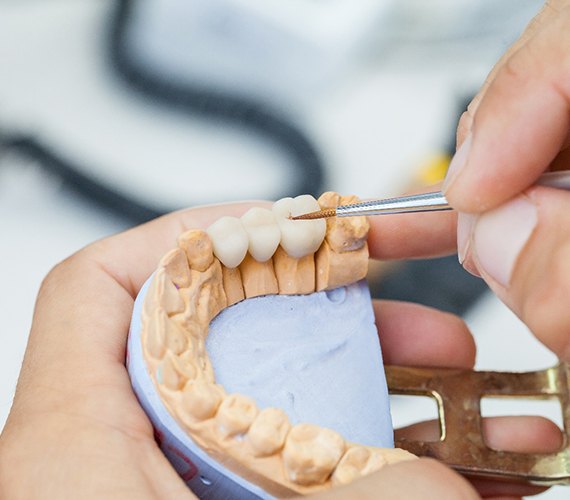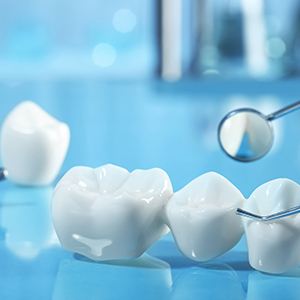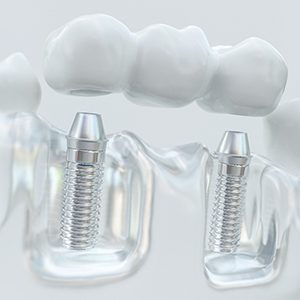Dental Bridges – Fort Worth , TX
Make Your Perfect Smile Complete!
If you’re missing teeth, you’re probably well aware that it can completely change the way that you feel about yourself and your smile. It can completely sap your self-esteem, as well as your ability to use your teeth to their fullest extent.
Thankfully, you don’t just have to live with gaps in your teeth. If you’re near Fort Worth, TX, dental bridges from Harris Parkway Dental Care can make your perfect smile complete. If you’re interested in learning more, make an appointment with us so we can talk about your options.
Why Choose Harris Parkway Dental Care For Dental Bridges?
- High-Quality Materials for Perfect Restorations
- Experienced Dental Team with Your Best Interest in Mind
- Accepts All PPO Insurance Plans
What is a Dental Bridge?

Broadly speaking, dental bridges consist of two dental crowns with a false tooth sandwiched in between them. They’re used for replacing anywhere from one to four teeth that are situated right next to each other—if you’re missing any more than that, another kind of tooth replacement may be a better option.
Dental bridges tend to made from some kind of ceramic, often porcelain or another tooth-colored material.
Types of Dental Bridges

There are two main kinds of dental bridges, and which one you should invest in depends on the particulars of your situation. We’ll be able to advise you better when we meet you in person, but here’s what you should know before then.
Traditional Dental Bridges

Traditional dental bridges are connected to the teeth themselves, affording the false teeth a level of stability that comes from your natural ones. This comes without any need for surgery. This makes this method of tooth replacement excellent for people who aren’t interested in invasive treatment.
Implant Bridges

On the other hand, implant bridges are held in place by two dental implants with a long string of false teeth placed on top of them. This gives your dental bridge additional stability and longevity when compared to a traditional alternative. You also won’t need to modify any healthy teeth in order to get your new dental bridge.
The Benefits of Getting a Dental Bridge

If you’re missing teeth, leaving a gap in your smile can cause some serious problems. It’s common for the surrounding teeth to move in and fill the hole, leading to serious misalignment. This is in addition to the decreased confidence and the difficulty in eating that may be associated with tooth loss.
Dental bridges make it easy to replace teeth that you’ve lost, so if you’re missing a few, don’t hesitate to make an appointment with us today!
Dental Bridges FAQs
How Long Should a Dental Bridge Last?
A typical dental bridge should work for about five to 15 years. That said, how long your own lasts will depend on factors unique to your situation.
Consider the device’s material, for instance. Dental bridges made from metals tend to last longer than metal-free ones, though that isn’t always true. Such appliances tend to be sturdier and more durable.
A more crucial factor to bridge lifespan is your lifestyle. After all, your diet, oral hygiene, and bad oral habits (if any) will affect how long your appliance lasts. How you treat your bridge can greatly impact whether it works for an extended period.
What Can You Not Eat with a Dental Bridge?
Rest assured that dental bridges can help you chew most foods easily. However, exercise caution around certain dishes to ensure your restoration lasts a long time.
For example, you may want to go easy on sticky foods. Items like fruit gummies, caramel, and gooey candies can loosen your bridge or even pull it right off. If that happens, you must pay for costly repair or replacement work.
It’s also best to limit your intake of sugary foods and drinks. If you have too many of them, they could decay the natural teeth (i.e., abutments) supporting your bridge. That process would put your device at risk of falling out and failing.
Can Dental Bridges Get Cavities?
A dental bridge is made of artificial materials, so it can’t get cavities. However, the teeth that support it can if you’re not careful.
Don’t forget that a normal dental bridge uses abutments – nearby natural teeth – to remain stable. If these supports start to decay near their crowns, they could cause your device to loosen. You’d then be in danger of losing your “new” teeth and having to get costly replacement or repair work.
Given the points above, clean the area around your dental bridge daily. Regular brushing and flossing will keep bacteria from decaying your abutments.
Do Dental Bridges Feel Natural?
All in all, yes – dental bridges do feel natural. A patient should quickly adjust to one’s presence within a few days of its placement.
This “naturalness” partly stems from a bridge’s materials. Since the device uses durable ceramic and porcelain, it can withstand everyday chewing forces like enamel. That means eating with your bridge shouldn’t cause any weird or strange sensations.
At the same time, remember that a bridge is customized for your mouth. Lab workers will have tailored it based on impressions of your adjacent teeth. To that extent, your final appliance shouldn’t feel awkward or even noticeable once placed.
